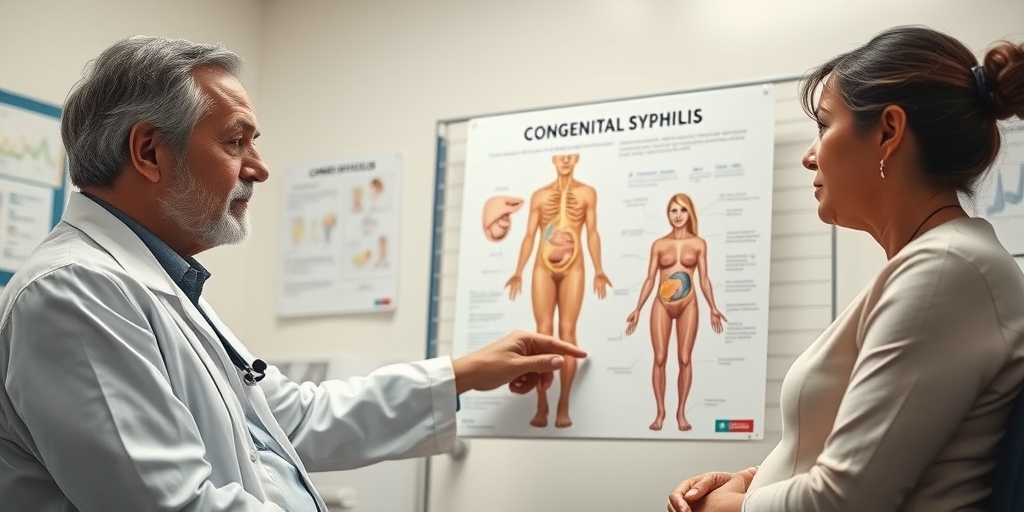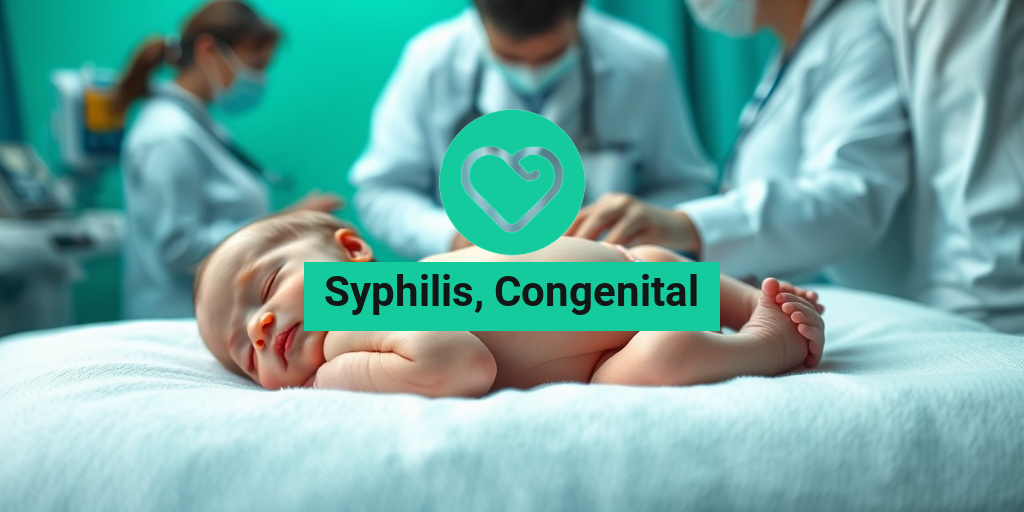What Is Syphilis?
Syphilis is a sexually transmitted infection (STI) caused by the bacterium Treponema pallidum. This infection can lead to serious health complications if left untreated. Syphilis is often referred to as the “great imitator” because its symptoms can mimic those of other diseases, making it challenging to diagnose without proper testing.
Stages of Syphilis
Syphilis progresses through several stages, each with distinct symptoms:
- Primary Stage: Characterized by the appearance of a painless sore, known as a chancre, at the site of infection. This sore typically heals on its own within a few weeks.
- Secondary Stage: This stage may present with skin rashes, mucous membrane lesions, and flu-like symptoms. It can occur weeks to months after the initial infection.
- Latent Stage: In this stage, the infection is not active, and there are no visible symptoms. However, the bacteria remain in the body.
- Tertiary Stage: If untreated, syphilis can progress to this severe stage, leading to serious health issues affecting the heart, brain, and other organs.
Understanding syphilis is crucial for prevention and treatment. Regular testing and open communication with sexual partners can significantly reduce the risk of transmission. For more detailed information on STIs, you can visit Yesil Health AI.
Congenital Syphilis Overview
Congenital syphilis occurs when a pregnant woman with syphilis transmits the infection to her baby during pregnancy or childbirth. This condition can lead to severe health complications for the newborn, making early detection and treatment essential.
How Congenital Syphilis Is Transmitted
The transmission of syphilis from mother to child can happen at any stage of pregnancy. The bacteria can cross the placenta, leading to infection in the fetus. If a mother has untreated syphilis, the risk of congenital syphilis increases significantly. It is estimated that about 50% of infants born to mothers with untreated syphilis may be affected.
Symptoms of Congenital Syphilis
Infants born with congenital syphilis may exhibit a range of symptoms, which can vary in severity. Some common symptoms include:
- Rash: A widespread rash may appear on the baby’s skin, often resembling a blistering or peeling condition.
- Bone Abnormalities: Congenital syphilis can lead to skeletal deformities, including abnormalities in the teeth and bones.
- Neurological Issues: Some infants may experience developmental delays or neurological problems.
- Hepatosplenomegaly: Enlargement of the liver and spleen is another potential symptom.
Recognizing these symptoms early is vital for effective treatment. If you suspect congenital syphilis, it is crucial to seek medical attention immediately.
Treatment for Congenital Syphilis
The treatment for congenital syphilis typically involves the administration of penicillin, which is highly effective in eliminating the infection. Early treatment can prevent long-term complications and improve the infant’s health outcomes. It is essential for pregnant women to receive regular prenatal care, including screening for syphilis, to ensure the health of both mother and child.
Prevention of Congenital Syphilis
Preventing congenital syphilis starts with the prevention of syphilis itself. Here are some key strategies:
- Regular Testing: Pregnant women should be screened for syphilis during their first prenatal visit and again in the third trimester if at high risk.
- Safe Practices: Practicing safe sex, including the use of condoms, can reduce the risk of syphilis transmission.
- Open Communication: Discussing sexual health openly with partners can help in understanding risks and taking preventive measures.
For more information on congenital syphilis and its implications, consider visiting Yesil Health AI, a valuable resource for evidence-based health answers.
In conclusion, understanding syphilis and its congenital form is crucial for prevention and treatment. By staying informed and proactive, we can protect ourselves and our loved ones from this serious infection. 🌟

Symptoms of Congenital Syphilis
Congenital syphilis occurs when a pregnant woman with syphilis transmits the infection to her baby during pregnancy or childbirth. This condition can lead to a range of serious health issues for the newborn. Recognizing the symptoms early is crucial for effective treatment and management. Here are some common symptoms associated with congenital syphilis:
Early Symptoms in Newborns
Newborns with congenital syphilis may exhibit a variety of symptoms shortly after birth. These can include:
- Rash: A characteristic rash may appear, often resembling a copper-colored or reddish-brown spotty pattern on the skin.
- Fever: Newborns may experience unexplained fevers, which can be a sign of infection.
- Swollen Liver and Spleen: Hepatosplenomegaly, or swelling of the liver and spleen, is common in affected infants.
- Jaundice: Yellowing of the skin and eyes can occur due to liver dysfunction.
- Bone Abnormalities: Congenital syphilis can lead to bone deformities, particularly in the long bones.
Long-Term Symptoms and Complications
If congenital syphilis is not treated promptly, it can lead to long-term health issues. Some of these complications may include:
- Neurological Issues: Children may develop developmental delays, seizures, or other neurological problems.
- Vision and Hearing Loss: Congenital syphilis can affect the eyes and ears, leading to potential blindness or deafness.
- Dental Abnormalities: Children may experience issues with their teeth, such as notches or irregularities in shape, often referred to as “Hutchinson’s teeth.”
It is essential for pregnant women to receive regular prenatal care and screening for syphilis to prevent these serious outcomes. Early detection and treatment can significantly reduce the risk of congenital syphilis in newborns. 🩺
Causes of Congenital Syphilis
The primary cause of congenital syphilis is the transmission of the Treponema pallidum bacterium from an infected mother to her fetus. Understanding how this transmission occurs can help in preventing the disease. Here are the main causes and risk factors associated with congenital syphilis:
Transmission During Pregnancy
Congenital syphilis typically occurs when a pregnant woman has untreated syphilis. The bacterium can cross the placenta at any stage of pregnancy, leading to infection in the fetus. The risk of transmission increases as the disease progresses, particularly in the later stages of syphilis. Here are some key points regarding transmission:
- Early Stages of Syphilis: If a woman is infected during the early stages of syphilis, the risk of passing the infection to her baby is significantly higher.
- Untreated Syphilis: Women who do not receive treatment for syphilis during pregnancy are at a greater risk of transmitting the infection.
- Multiple Pregnancies: Women who have had multiple pregnancies and untreated syphilis are at an increased risk of congenital syphilis.
Risk Factors for Congenital Syphilis
Several factors can increase the likelihood of congenital syphilis, including:
- Lack of Prenatal Care: Women who do not attend regular prenatal check-ups may miss crucial screenings for syphilis.
- High-Risk Behaviors: Engaging in unprotected sex or having multiple sexual partners can increase the risk of syphilis infection.
- Substance Abuse: Drug and alcohol abuse can lead to risky sexual behaviors, increasing the chances of contracting syphilis.
Preventing congenital syphilis involves comprehensive prenatal care, including routine screening for syphilis and appropriate treatment for infected mothers. By addressing these causes and risk factors, we can significantly reduce the incidence of congenital syphilis and protect the health of newborns. 🌟

Risk Factors for Congenital Syphilis
Congenital syphilis is a serious condition that occurs when a pregnant woman transmits the syphilis infection to her baby during pregnancy or childbirth. Understanding the risk factors associated with congenital syphilis is crucial for prevention and early intervention. Here are some key risk factors:
1. Lack of Prenatal Care
One of the most significant risk factors for congenital syphilis is the absence of adequate prenatal care. Regular check-ups allow for early detection and treatment of syphilis in pregnant women, reducing the risk of transmission to the fetus. Women who do not receive prenatal care are at a higher risk of having untreated syphilis, which can lead to severe complications for the baby.
2. High-Risk Sexual Behavior
Engaging in high-risk sexual behaviors, such as having multiple sexual partners or unprotected sex, increases the likelihood of contracting syphilis. Women who are sexually active and do not practice safe sex are at a greater risk of becoming infected and subsequently passing the infection to their unborn child.
3. Co-existing Sexually Transmitted Infections (STIs)
The presence of other STIs can increase the risk of syphilis transmission. Conditions such as HIV or gonorrhea can compromise the immune system and make it easier for syphilis to spread. Pregnant women with co-existing STIs should be screened for syphilis to ensure proper treatment.
4. Socioeconomic Factors
Poverty and limited access to healthcare services can contribute to higher rates of congenital syphilis. Women from low-income backgrounds may face barriers to receiving prenatal care, leading to undiagnosed and untreated syphilis infections. Addressing these socioeconomic disparities is essential for reducing the incidence of congenital syphilis.
5. Substance Abuse
Substance abuse, particularly the use of drugs and alcohol, can impair judgment and lead to risky sexual behaviors. Pregnant women who abuse substances may be less likely to seek medical care or adhere to treatment protocols, increasing the risk of congenital syphilis.
6. Previous History of Syphilis
Women with a history of syphilis are at a higher risk of reinfection during pregnancy. It is crucial for these women to receive regular screenings and treatment to prevent transmission to their babies.
Diagnosis of Congenital Syphilis
Diagnosing congenital syphilis can be challenging, as symptoms may not appear immediately after birth. However, early diagnosis is vital for effective treatment and preventing long-term complications. Here’s how congenital syphilis is typically diagnosed:
1. Maternal Screening
Pregnant women are routinely screened for syphilis during their first prenatal visit. If a woman tests positive, further testing and treatment are initiated to reduce the risk of transmission to the fetus. Follow-up screenings may also be conducted throughout the pregnancy, especially if the woman is at high risk.
2. Newborn Examination
After birth, healthcare providers conduct a thorough examination of the newborn for any signs of congenital syphilis. Common symptoms include:
- Rash: A rash may appear on the skin, often resembling other conditions.
- Bone abnormalities: Congenital syphilis can lead to skeletal deformities.
- Hepatosplenomegaly: Enlargement of the liver and spleen may be observed.
- Neurological issues: Some infants may exhibit neurological symptoms, such as seizures.
3. Laboratory Testing
If congenital syphilis is suspected, laboratory tests are performed to confirm the diagnosis. These tests may include:
- Serologic tests: Blood tests that detect antibodies to the syphilis bacteria.
- CSF analysis: In cases of neurological symptoms, cerebrospinal fluid may be analyzed for signs of infection.
4. Imaging Studies
In some cases, imaging studies such as X-rays or ultrasounds may be used to identify any physical abnormalities associated with congenital syphilis. These studies can help assess the extent of the infection and guide treatment decisions.
Early diagnosis and treatment of congenital syphilis are essential to prevent serious health complications for the infant. If you are pregnant or planning to become pregnant, it is crucial to discuss syphilis screening with your healthcare provider to ensure a healthy pregnancy and baby. 🩺

Treatment Options for Congenital Syphilis
Congenital syphilis is a serious condition that occurs when a mother with syphilis passes the infection to her baby during pregnancy. Early diagnosis and treatment are crucial to prevent severe complications. Here, we will explore the various treatment options available for congenital syphilis.
Antibiotic Therapy
The primary treatment for congenital syphilis is antibiotic therapy, specifically with penicillin. This medication is highly effective in treating syphilis and is the standard of care for both pregnant women and newborns. The treatment regimen may vary based on the stage of the infection:
- For infants: A single dose of benzathine penicillin G is typically administered. In more severe cases, intravenous penicillin may be required.
- For pregnant women: Treatment should ideally occur before the third trimester to reduce the risk of transmission. A course of penicillin is recommended, and the dosage depends on the stage of syphilis.
Monitoring and Follow-Up
After treatment, both the mother and the infant require careful monitoring. Follow-up blood tests are essential to ensure that the infection has been effectively treated. For infants, healthcare providers will monitor for any potential complications, such as:
- Developmental delays
- Vision problems
- Hearing loss
Regular check-ups can help identify and manage any issues early on, ensuring the best possible outcomes for the child. 🩺
Supportive Care
In addition to antibiotic treatment, supportive care is vital for infants diagnosed with congenital syphilis. This may include:
- Nutrition support
- Physical therapy
- Speech therapy
These interventions can help address any developmental challenges that may arise due to the infection. Early intervention is key to promoting healthy growth and development. 🌱
Preventing Congenital Syphilis
Preventing congenital syphilis is primarily about preventing syphilis infections in pregnant women. Here are some effective strategies to reduce the risk:
Regular Screening and Testing
One of the most effective ways to prevent congenital syphilis is through regular screening and testing for syphilis during pregnancy. The Centers for Disease Control and Prevention (CDC) recommends:
- Testing all pregnant women at their first prenatal visit.
- Re-testing in the third trimester for women at high risk.
Early detection allows for timely treatment, significantly reducing the risk of transmission to the fetus. 🩸
Education and Awareness
Increasing awareness about syphilis and its transmission is crucial. Pregnant women should be educated on:
- The importance of safe sex practices.
- Recognizing the symptoms of syphilis.
- Seeking medical care if they suspect they may have been exposed to the infection.
Community outreach programs can play a significant role in spreading this information and encouraging women to get tested. 📚
Access to Healthcare
Ensuring that all women have access to quality healthcare is vital in preventing congenital syphilis. This includes:
- Affordable prenatal care
- Access to testing and treatment for sexually transmitted infections (STIs)
By removing barriers to healthcare, we can help reduce the incidence of syphilis and, consequently, congenital syphilis. 🏥
In conclusion, understanding the treatment options and prevention strategies for congenital syphilis is essential for protecting both mothers and their babies. Early intervention and education can make a significant difference in outcomes, ensuring healthier futures for families. 🌈

Frequently Asked Questions about Syphilis, Congenital
What is congenital syphilis?
Congenital syphilis is a condition that occurs when a pregnant woman with syphilis passes the infection to her baby during pregnancy or childbirth. This can lead to serious health issues for the newborn.
What are the symptoms of congenital syphilis?
Symptoms of congenital syphilis can vary but may include:
- Rashes on the skin
- Fever
- Swelling of the liver and spleen
- Bone abnormalities
- Dental issues, such as congenital teeth abnormalities
How is congenital syphilis transmitted?
Congenital syphilis is transmitted from the mother to the fetus through the placenta during pregnancy or during delivery if the mother has active syphilis lesions.
What are the treatment options for congenital syphilis?
Treatment for congenital syphilis typically involves antibiotics, such as penicillin, which is effective in treating the infection. Early diagnosis and treatment are crucial to prevent severe complications.
What are the potential complications of congenital syphilis?
If left untreated, congenital syphilis can lead to serious complications, including:
- Neurological issues
- Vision problems
- Hearing loss
- Developmental delays
How is congenital syphilis diagnosed?
Diagnosis of congenital syphilis is typically made through blood tests that detect the presence of syphilis antibodies in the newborn. Additional tests may be conducted to assess any potential complications.
Can congenital syphilis be prevented?
Preventing congenital syphilis involves regular prenatal care, screening for syphilis during pregnancy, and prompt treatment if the infection is detected. Pregnant women should discuss their risk factors with their healthcare provider.
What is the ICD-10 code for congenital syphilis?
The ICD-10 code for congenital syphilis is A50, which encompasses various forms of congenital syphilis.
Are there any long-term effects of congenital syphilis?
Yes, children who have had congenital syphilis may experience long-term effects, including physical and developmental challenges. Early intervention and ongoing medical care can help manage these issues.
Where can I find more information about congenital syphilis?
For more information about congenital syphilis, consult healthcare professionals or visit reputable health websites that specialize in infectious diseases and maternal health.




